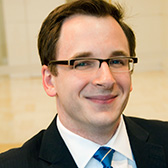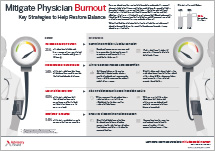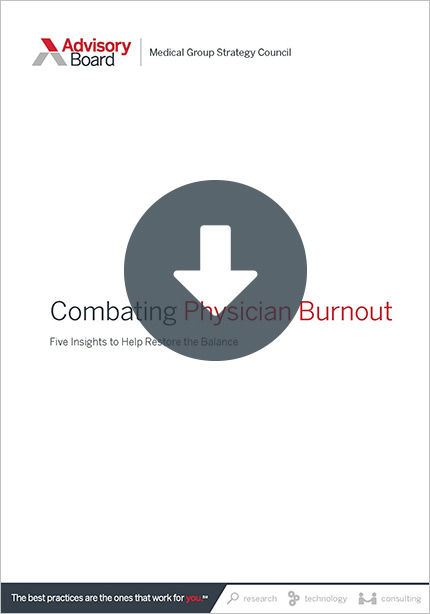Auto logout in seconds.
Continue LogoutEditor's note: This story was updated on August 22, 2018.
Read Advisory Board's take on this story.
Cleveland Clinic over the past decade has launched five programs to boost physician well-being—and physician engagement, trust, and communication have all risen as a result, according to Susan Rehm, executive director of physician health at the Clinic, Christopher Cheney reports for HealthLeaders Media.
Rehm said, "We made a strategic decision when we started our efforts a couple years ago to focus on well-being rather than burnout. We prefer to focus on getting well and staying well." With that strategy in mind, the 11-hospital system launched these five programs:
1. Created a 'Well-Being Day'
The Clinic launched Well-Being Day in January 2017, an initiative that allows physicians to take time off to do "something that contributes to one's personal well-being," Rehm said. She added that the implementation of Well-Being Day "was a good start to demonstrate how Cleveland Clinic endorses well-being for the physician staff."
2. Established peer coaches to support well-being
About nine years ago, the Clinic started a coaching and mentoring program that included a day-long orientation for staff members who wanted to either be coached or coach others, Cheney reports.
Three years ago, the program added training for advanced peer coaches, who Rehm said "help peers [with] career issues who need more intensive help than the average person looking for career development advice." Since then, more than 100 people have been trained in advanced peer coaching, and internal data suggest those who are in the program are "much more satisfied with their work and their lives," Rehm said.
3. Launched town halls to gather staff feedback
In 2017, the Clinic's professional staff affairs office launched a series of town halls during which attendees discussed staff suggestions about changes that could be made to the Clinic's operations. The office's staff also act as consultants to assist managers with well-being-related staffing needs.
4. Made the EHR less frustrating for providers
The Clinic beginning in 2016 launched a number of initiatives aimed at creating a more user-friendly EHR—to help alleviate a major source of provider frustration and burnout.
For example, the Clinic developed two applications that allow physicians to view and interact with EHRs on their handheld devices. The Clinic's IT staff played a key role in the initiative, Rehm said: "With every change that comes through, there are consultants from our information technology division who … help us with how we interact with the medical record, so we're not wasting a lot of time doing things that could be done more efficiently."
5. Cultivated empathy
For a number of years, all new hires at the Clinic have been required to participate in communication training called Relationship: Establishment, Development, and Engagement (R.E.D.E.), which focuses on cultivating empathy, Cheney reports.
According to Rehm, the R.E.D.E. approach "can involve the use of empathy to bring out a patient's experience with their illness, their expectations, and how they wish to proceed."
The R.E.D.E. approach has shown positive results with physicians, according to Rehm, who said that, after going through the training, "physicians reported feeling more empathy and less burnout."
Gauging success
While Rehm said measuring the financial impact of the Clinic's physician well-being programs can be difficult, the health system last year saw a statistically significant increase in physician satisfaction. According to Cheney, the Clinic scores, which are measured on a scale of 0 to 5, rose by:
- .04 for physician engagement;
- .04 for physician well-being;
- .04 for trust;
- .04 for communication; and
- .03 for continuous improvement.
Further, Rehm said initiatives relied largely on existing resources, so costs were low. "The literature suggests that turnover of a physician costs the organization somewhere between $250,000 and $500,000. It wouldn’t take too many retained doctors to completely pay for the programs," she said (Cheney, HealthLeaders Media, 5/31).
Advisory Board's take


Craig Pirner, Managing Director, Talent Development, and Sarah Evans, Senior Consultant, Talent Development
Cleveland Clinic's focus on proactively promoting physician well-being is emblematic of a larger trend among progressive health care organizations. In our own leadership development partnerships with 200+ health systems, we're seeing organizations shift focus from burnout recovery to burnout prevention.
One of the best ways to foster burnout prevention is to foster physicians' competence with stress management. For instance, our Talent Development workshops equip physician leaders to take greater control of their stress by teaching several tactics, including:
- Respond to stress productively: Many people's instinctive in-the-moment stress reactions—such as rumination, procrastination, or complaint—can actually exacerbate stress in the long-term. Help physicians consciously identify their default coping tendencies and foster healthier stress response habits. This knowledge allows physicians to identify when they're reverting back to unproductive stress response patterns—and choose instead to deploy a productive response.
- Clarify priorities: Most of us have a to-do list that's longer than we'd like it to be, in part because we inadvertently consider everything to be a "priority." Teach physicians a process by which to clarify their true priorities—and scope their to-do list accordingly. This focuses work and may even free-up calendar time devoted to low-priority activities. Eliminating just one meeting a week can make a difference.
- Learn to say "no": It's hard to say "no," but effective leaders do it on a regular basis—and do it in a way that maintains the quality of their relationships. Give physicians models for how to say "no" to requests that don't align with priorities, and provide them time to practice the use of those models. Enabling physicians to say "no" can both free up time and create a stronger sense of autonomy.
Most of these techniques focus on building ways to proactively manage personal stress and, given the prevalence of physician burnout, that's reason enough to invest in proactively building physicians' stress management competence.
However, research also suggests that when leaders model effective stress management tactics, their teams also have lower stress levels. That means that investing in personal well-being strategies among physicians in leadership roles can complement and amplify the types of organizational strategies that Cleveland Clinic and other progressive organizations are pursuing.
To learn how you can develop these skills and others among your physician leaders, visit our dedicated page on leadership development for physicians.
Learn more: Register for our 2018-2019 National Meeting
Join us for our 2018-2019 national meetings series to learn about medical groups can deploy innovation to solve their most pressing business challenges.
Save your Spot
Don't miss out on the latest Advisory Board insights
Create your free account to access 1 resource, including the latest research and webinars.
Want access without creating an account?
You have 1 free members-only resource remaining this month.
1 free members-only resources remaining
1 free members-only resources remaining
You've reached your limit of free insights
Become a member to access all of Advisory Board's resources, events, and experts
Never miss out on the latest innovative health care content tailored to you.
Benefits include:
You've reached your limit of free insights
Become a member to access all of Advisory Board's resources, events, and experts
Never miss out on the latest innovative health care content tailored to you.
Benefits include:
This content is available through your Curated Research partnership with Advisory Board. Click on ‘view this resource’ to read the full piece
Email ask@advisory.com to learn more
Click on ‘Become a Member’ to learn about the benefits of a Full-Access partnership with Advisory Board
Never miss out on the latest innovative health care content tailored to you.
Benefits Include:
This is for members only. Learn more.
Click on ‘Become a Member’ to learn about the benefits of a Full-Access partnership with Advisory Board
Never miss out on the latest innovative health care content tailored to you.


